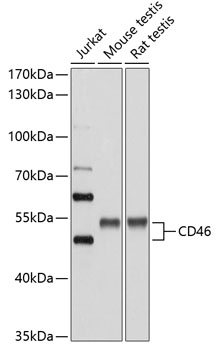-
Product Name
CD46 Polyclonal Antibody
- Documents
-
Description
Polyclonal antibody to CD46
-
Tested applications
WB
-
Species reactivity
Human, Mouse, Rat
-
Alternative names
CD46 antibody; AHUS2 antibody; MCP antibody; MIC10 antibody; TLX antibody; TRA2.10 antibody; CD46 molecule antibody
-
Isotype
Rabbit IgG
-
Preparation
Antigen: Recombinant fusion protein containing a sequence corresponding to amino acids 40-320 of human CD46 (NP_722548.1).
-
Clonality
Polyclonal
-
Formulation
PBS with 0.02% sodium azide, 50% glycerol, pH7.3.
-
Storage instructions
Store at -20℃. Avoid freeze / thaw cycles.
-
Applications
WB 1:500 - 1:2000
-
Validations

Western blot - CD46 Polyclonal Antibody
Western blot analysis of extracts of various cell lines, using CD46 antibody at 1:1000 dilution.Secondary antibody: HRP Goat Anti-Rabbit IgG (H+L) at 1:10000 dilution.Lysates/proteins: 25ug per lane.Blocking buffer: 3% nonfat dry milk in TBST.Detection: ECL Basic Kit .Exposure time: 5s.
-
Background
Acts as a cofactor for complement factor I, a serine protease which protects autologous cells against complement-mediated injury by cleaving C3b and C4b deposited on host tissue. May be involved in the fusion of the spermatozoa with the oocyte during fertilization. Also acts as a costimulatory factor for T-cells which induces the differentiation of CD4+ into T-regulatory 1 cells. T-regulatory 1 cells suppress immune responses by secreting interleukin-10, and therefore are thought to prevent autoimmunity.; (Microbial infection) A number of viral and bacterial pathogens seem to bind MCP in order to exploit its immune regulation property and directly induce an immunosuppressive phenotype in T-cells.; (Microbial infection) Acts as a receptor for Adenovirus subgroup B2 and Ad3.; (Microbial infection) Acts as a receptor for cultured Measles virus.; (Microbial infection) Acts as a receptor for Herpesvirus 6/HHV-6.; (Microbial infection) May act as a receptor for pathogenic bacteria Neisseria and Streptococcus pyogenes.
Related Products / Services
Please note: All products are "FOR RESEARCH USE ONLY AND ARE NOT INTENDED FOR DIAGNOSTIC OR THERAPEUTIC USE"
